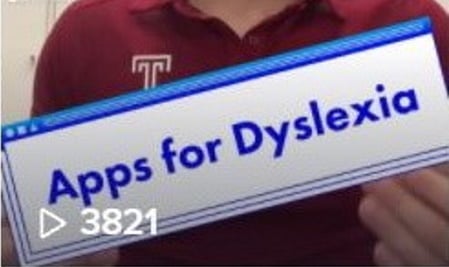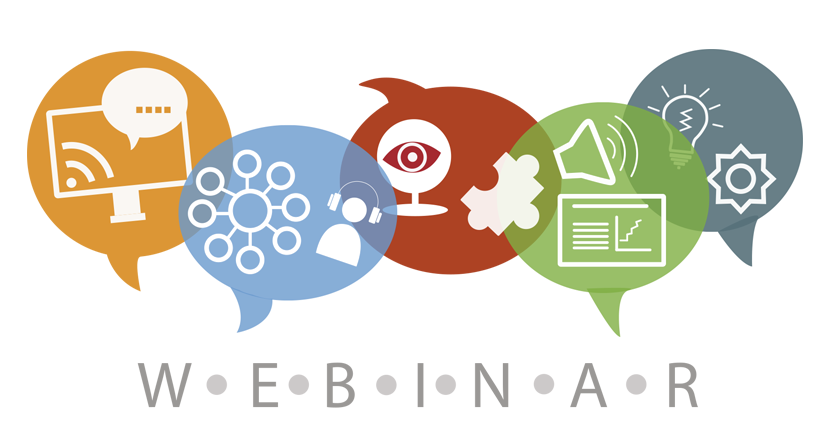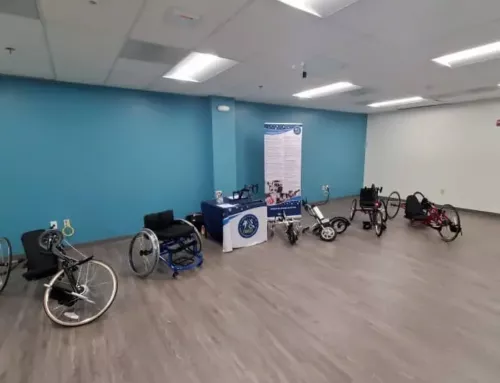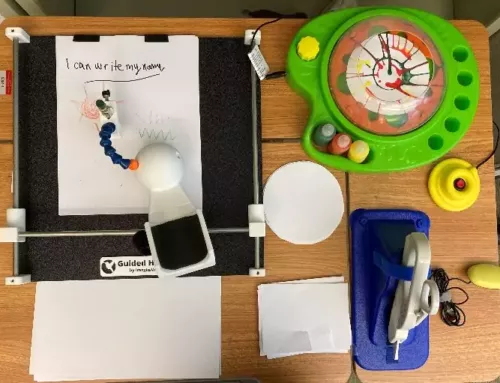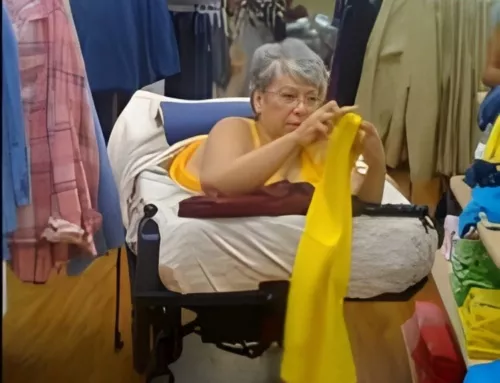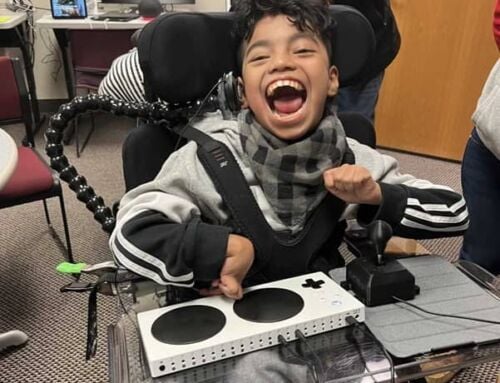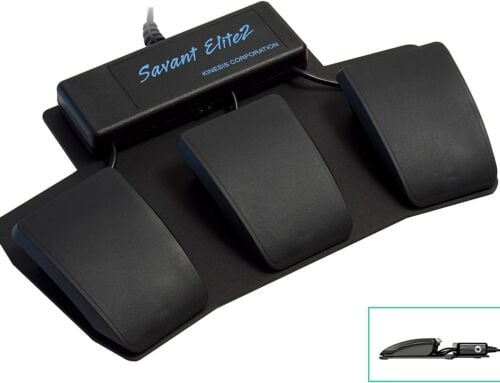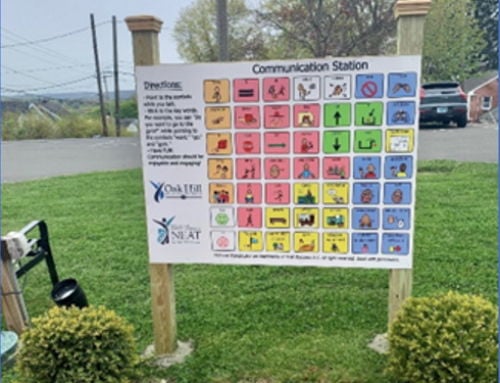AT Act Programs Support Vaccination
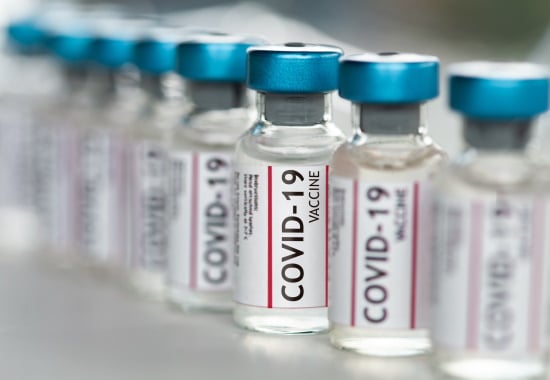
In this latest COVID-19 Issue Brief, AT3 Center highlights the ways AT Act Programs have stepped up to support accessible vaccination for persons with disabilities and older adults.

On October 1, 2021, the CDC reported that compared with adults without a disability, adults with a disability have a lower likelihood of receiving a COVID-19 vaccination though they are more willing to be vaccinated, and though they are at increased risk for COVID-19-related illness and death. Then a report released October 5, 2021, by the U.S. Dept. of Health and Human Services reinforced the effectiveness of vaccination, showing that among Medicare beneficiaries alone, vaccines may have helped prevent 265,000 infections, 107,000 hospitalizations, and 39,000 deaths between January and May of this year. The CDC report deduces: “Reducing barriers to scheduling and making vaccination sites more accessible might improve vaccination coverage among persons with disabilities.”
Assistive technology (AT) assists individuals with disabilities and older adults to accomplish vital tasks and goals, such as acquiring vaccination. For this reason, removing barriers to vaccination is among the urgent activities a majority of State and Territory AT Act Programs are now undertaking. On September 21, 2021, AT Act Programs—charged with increasing awareness of, access to, and acquisition of AT—were queried by the AT3 Center; 72% reported supporting vaccination efforts, 44% reported supporting vaccination booster efforts, and 80% report actively trying to provide supports to vaccination efforts (43 of 56 programs responding).
Specifically, the AT Act Programs are:
- loaning assistive technology and durable medical equipment to vaccination sites,
- ensuring that materials distributed at vaccination sites are accessible,
- developing accessibility checklists for vaccination sites,
- creating and distributing toolkits to vaccination sites with equipment and materials for individuals with disabilities (e.g., visual and hearing impairments) and plain language information,
- distributing accessible information on vaccination,
- supporting accessible Information and Communication Technology (ICT) efforts for COVID-19 information, including vaccination registration websites.
AT Act Program Highlights:
California:
Ability Tools works closely with CA’s Governor’s Office of Emergency Services and has played numerous roles combatting the pandemic in support of individuals with disabilities. These include hosting pop-up vaccination sites (a pilot that FEMA identified as a best practice) and distributing vaccine consumer toolkits in English and Spanish with disability organizations statewide. Most recently, the program has spearheaded vaccination outreach in underserved geographic areas (with funding through a CA public health foundation). Christina Mills, Ability Tools Director, reports, “We are running a series of disability culturally-competent ads in mainstream media outlets and on social media. The ads are in English and Spanish, but also give people the power to choose which communication method works best for them to reach us.” (Text, email, or an 800 line are all supported.) Ability Tools has also presented their vaccine consumer toolkit at the White House Vaccine Campaign and additional events designed to educate about conducting effective outreach.
Maryland:
The Maryland Technology Assistance Program has played a critical role in identifying appropriate accommodations for vaccination sites and testing and remediating vaccination websites and the contact tracing app. This website work continues; evaluations with CovidLink, GoVax, PrepMod, MyIR are underway. Director Lori Markland says, “We’ve built a rapport with the various website developers, and our IT team maintains regular contact with them as well as the Department of Health and the Maryland Department of Disabilities Emergency Preparedness Director to ensure sites are evaluated and remediated. We also work directly with agency representatives and constituents when a complaint is issued.” The program additionally distributes a weekly accessible spreadsheet of vaccination sites around the state that is made available on the Maryland Dept. of Health’s website vaccine locator page and is shared with contacts at the National Federation for the Blind.
North Carolina:
Since the start of the pandemic, NC AT Program has provided leadership on state website accessibility for COVID-19 information, work that has expanded to include vaccine registration websites, and guidance to providers (private, state, and federal) on the physical accessibility of vaccination sites and the vaccination process (in partnership with the Dept. of Public Health). “The biggest lesson learned,” says Director Tammy Kroger, “is to get involved early and make things accessible at the beginning versus retrofitting. We worked with the Department of Health and Human Services Public Affairs to ensure the website was accessible and all documents were accessible. They have a team that understands accessibility now as it relates to COVID and the DHHS website.” The program has since focused on its one-to-one work with individuals, providing access to AT for the purpose of accessing telehealth and scheduling appointments.
Virginia:
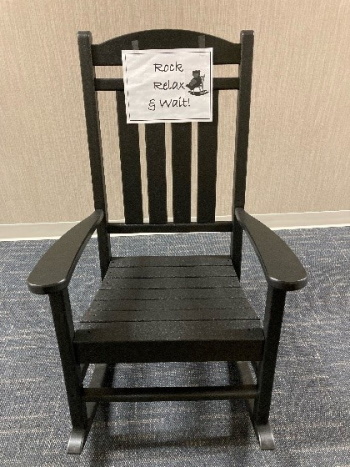
The Virginia Assistive Technology System (VATS) received funding through its partnership with No Wrong Door (NWD) Virginia to provide AT services and equipment to older adults and Virginians with disabilities and improve access to COVID-19 vaccinations, home-based services, and address social isolation. VATS has supported multiple vaccination site events at the Department for Aging and Rehabilitative Services (DARS) Greater Richmond Office and walk-in clinics administered by the Dept. of Health (VDH). VATS staff were on-site and provided a variety of AT devices for use/demonstration and information on VATS and NWD services. AT equipment included personal listening devices, magnifiers, wheelchairs, rollators, portable canes, and an array of equipment to relieve stress and promote a calming vaccination experience.
Texas:
As a part of the Texas Partners for Inclusive Access, the Texas Technology Access Program is organizing to provide access to COVID-19 vaccines for individuals with disabilities. Activities include: creating vaccine hotlines; providing a means for persons with disabilities to be vaccinated in their homes; funding entities to set up vaccine clinics and access; creating an app for entities to refer persons with disabilities for vaccines (that triggers a follow-up call from a live scheduler); creating a data collection tool in English and Spanish for consumers to record their experience accessing vaccines; disseminating accessible COVID-19 and vaccination resources; providing information on making vaccination sites accessible; creating a media toolkit and launching a public awareness campaign in support of individuals with disabilities getting vaccinated.
Monthly Blog Digest
Search the blog
State AT Program Blogs
California
Florida
Indiana
Kentucky
Louisiana
Maryland
Massachusetts
Michigan
Montana
North Carolina
North Dakota
Utah
State AT Program Blogs
The AT3 Center, the Association of AT Act Programs (ATAP), and the Administration on Community Living (ACL) make no endorsement, representation, or warranty expressed or implied for any product, device, or information set forth in this blog. The AT3 Center, ATAP, and ACL have not examined, reviewed, or tested any product or device hereto referred.

